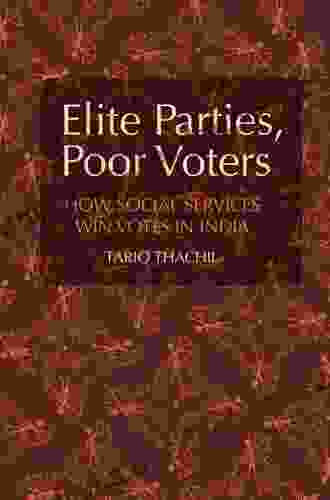Unraveling the Divided Loyalties: Elite Parties and the Poor in Democratic Societies


5 out of 5
| Language | : | English |
| File size | : | 3827 KB |
| Text-to-Speech | : | Enabled |
| Screen Reader | : | Supported |
| Enhanced typesetting | : | Enabled |
| Word Wise | : | Enabled |
| Print length | : | 345 pages |
In the intricate tapestry of democratic societies, the relationship between elite parties and the poor is a particularly contentious and multifaceted one. Throughout history, various factors have contributed to the divide between these two societal groups, leading to significant political polarization and economic disparity.
Historical Roots of the Divide
The origins of this divide can be traced back to the very foundations of modern democracies. In the early days of representative government, suffrage was often restricted to wealthy landowners and other elites. As a result, the interests of the poor were often neglected or outright ignored by those in power.
Over time, as democratic reforms expanded voting rights, the gap between the elite and the poor gradually narrowed. However, the legacy of their historical separation continues to shape the dynamics of contemporary politics in many societies.
Motivations for Elite Party Loyalty
Elite parties, typically representing the interests of wealthy business owners, professionals, and high-income earners, have their own reasons for maintaining their distance from the poor. These motivations include:
- Protection of Economic Interests: Elite parties prioritize policies that preserve the wealth and privilege of their constituents. This often means opposing measures that could benefit the poor, such as increased taxation or expanded social programs.
- Social and Cultural Values: Members of elite parties often hold conservative social and cultural values that differ from those of the poor. This can lead to a lack of empathy and understanding between the two groups.
- Political Power: Elite parties rely on the support of their wealthy constituents to maintain their political power. Catering to the needs of the poor could alienate these core supporters.
Obstacles to Poor Voter Participation
On the other hand, the poor face a number of obstacles that limit their participation in the political process and make it difficult for their voices to be heard:
- Economic Disparities: Poverty can severely restrict access to education, healthcare, and other resources that enable political participation.
- Lack of Political Knowledge: Due to limited access to education and information, many poor voters lack the knowledge and understanding necessary to navigate the political system.
- Institutional Barriers: Voter suppression laws, gerrymandering, and other institutional barriers can make it difficult for the poor to register to vote or cast their ballots.
Consequences of the Divide
The divide between elite parties and the poor has far-reaching consequences for democratic societies:
- Political Polarization: The lack of representation for the poor leads to increased political polarization, as the two groups become entrenched in their opposing views.
- Social Inequality: The policies pursued by elite parties often exacerbate social inequality, as they favor the wealthy at the expense of the poor.
- Erosion of Democracy: When large segments of society feel excluded from the political process, it can undermine the legitimacy of democratic institutions.
Bridging the Gap
Despite the challenges, there are ways to bridge the gap between elite parties and the poor:
- Progressive Policies: Elite parties must adopt policies that address the needs of the poor, such as affordable housing, healthcare, and education.
- Inclusive Political Discourse: Politicians and media outlets should make a conscious effort to include the perspectives and experiences of the poor in public discourse.
- Grassroots Mobilization: Poor communities need to organize and advocate for their interests, building coalitions with other marginalized groups.
The relationship between elite parties and the poor in democratic societies is a complex and multifaceted one. Historical factors, motivations, and obstacles have all contributed to the divide between these two groups. This divide has led to political polarization, social inequality, and the erosion of democracy. Bridging this gap requires progressive policies, inclusive political discourse, and grassroots mobilization to ensure that the voices of the poor are heard and their needs are met.
5 out of 5
| Language | : | English |
| File size | : | 3827 KB |
| Text-to-Speech | : | Enabled |
| Screen Reader | : | Supported |
| Enhanced typesetting | : | Enabled |
| Word Wise | : | Enabled |
| Print length | : | 345 pages |
Do you want to contribute by writing guest posts on this blog?
Please contact us and send us a resume of previous articles that you have written.
 Book
Book Novel
Novel Chapter
Chapter Genre
Genre Paperback
Paperback E-book
E-book Magazine
Magazine Newspaper
Newspaper Glossary
Glossary Bibliography
Bibliography Foreword
Foreword Annotation
Annotation Codex
Codex Classics
Classics Library card
Library card Narrative
Narrative Memoir
Memoir Reference
Reference Encyclopedia
Encyclopedia Narrator
Narrator Resolution
Resolution Librarian
Librarian Catalog
Catalog Card Catalog
Card Catalog Stacks
Stacks Archives
Archives Study
Study Research
Research Lending
Lending Reserve
Reserve Academic
Academic Journals
Journals Reading Room
Reading Room Rare Books
Rare Books Interlibrary
Interlibrary Thesis
Thesis Storytelling
Storytelling Awards
Awards Reading List
Reading List Textbooks
Textbooks Kristin Tate
Kristin Tate Fabio Peres
Fabio Peres Raphael Verkest
Raphael Verkest Robert Charvin
Robert Charvin William Michael Cunningham
William Michael Cunningham Fredrik Borjesson
Fredrik Borjesson John Sazaklis
John Sazaklis Ernest Holmes
Ernest Holmes Beth Evans
Beth Evans Cerridwen Greenleaf
Cerridwen Greenleaf Clarence Darrow
Clarence Darrow Frank Luby
Frank Luby Paco Lorente
Paco Lorente J Smith
J Smith Julia Pimsleur
Julia Pimsleur Alexandre Chardin
Alexandre Chardin Tony Benn
Tony Benn Sean Yom
Sean Yom Elliot Liebow
Elliot Liebow Marissa Meyer
Marissa Meyer
Light bulbAdvertise smarter! Our strategic ad space ensures maximum exposure. Reserve your spot today!

 Nathaniel HawthorneUnleashing the Power of Project Leadership: A Comprehensive Guide to Leading...
Nathaniel HawthorneUnleashing the Power of Project Leadership: A Comprehensive Guide to Leading... Rubén DaríoFollow ·14.9k
Rubén DaríoFollow ·14.9k Everett BellFollow ·6k
Everett BellFollow ·6k Walter SimmonsFollow ·6.7k
Walter SimmonsFollow ·6.7k George Bernard ShawFollow ·4k
George Bernard ShawFollow ·4k Evan SimmonsFollow ·4.7k
Evan SimmonsFollow ·4.7k John UpdikeFollow ·15.5k
John UpdikeFollow ·15.5k Clinton ReedFollow ·16.4k
Clinton ReedFollow ·16.4k Tyrone PowellFollow ·18.8k
Tyrone PowellFollow ·18.8k

 Anton Chekhov
Anton ChekhovClarinet Fundamentals: A Systematic Fingering Course for...
Welcome to the exciting world of...

 Gage Hayes
Gage HayesSea Prayer: A Haunting and Heartbreaking Story of...
Sea Prayer, the latest...

 Henry Green
Henry GreenPillars of Society Rosmersholm Little Eyolf When We Dead...
Henrik Ibsen, the towering...

 Robert Reed
Robert Reed10 For 10 Sheet Music Classical Piano Favorites: A...
Learning to play the...
5 out of 5
| Language | : | English |
| File size | : | 3827 KB |
| Text-to-Speech | : | Enabled |
| Screen Reader | : | Supported |
| Enhanced typesetting | : | Enabled |
| Word Wise | : | Enabled |
| Print length | : | 345 pages |














